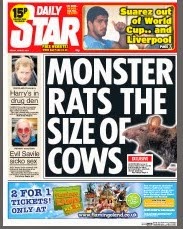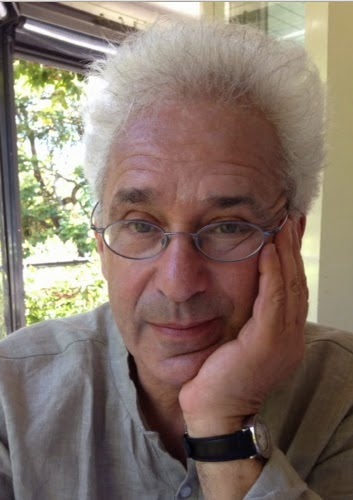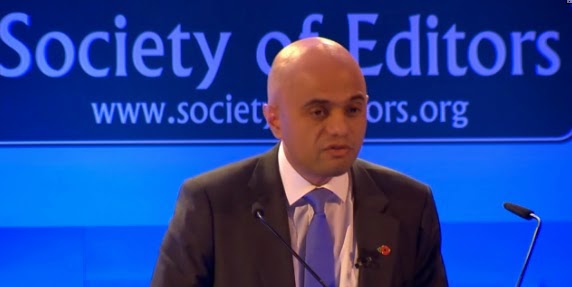The Times [£] reveals police used the Regulation of Investigatory Powers Act (Ripa) to obtain a journalist's phone records: "Police investigating the Chris Huhne speeding points scandal secretly obtained the phone records of a journalist and one of his sources for the story, even though a judge had agreed that the source could remain confidential, The Times can reveal. A Kent police officer was granted authorisation to obtain the billing and call data of a Mail on Sunday journalist, alongside his source, who was later unmasked as a freelance journalist."
Press Gazette: "Journalists’ telephone records were seized in order to track down the whistleblowers who revealed former Government chief whip Andrew Mitchell’s altercation with officers outside 10 Downing Street."
The Sun [£]: "THE Sun has made an official complaint about the Met Police using anti-terror laws to snoop on the phone calls of our journalists."
Press Gazette: "The Interception of Communications Commissioner has announced an inquiry into police use of spying powers against journalists. The move comes less than a month after Press Gazette launched the Save Our Sources campaign urging the Commissioner to take action after it emerged that the police had secretly grabbed the phone records of The Sun newspaper."
The Sun [£] in a leader: "The secret snooping on our political editor Tom Newton Dunn’s mobile phone records by the Metropolitan Police after the ‘Plebgate’ scandal is an outrage…We applaud the Government’s interceptions watchdog for deciding to investigate this scandal. The Met must not get away with it.”
The Guardian in a leader: "Journalists are not above the law, but they need its protections to play a legitimate role in our free society. Ripa as it stands fails to provide such protections. It must be changed."
The Telegraph in a leader: "If whistleblowers think the police are going to find out they have been talking to journalists, they will withhold information. It would seem the police are posing a serious threat to the ability of the press to carry out its proper role in a free country."
Mr Justice Mitting finding in favour of the Sun in the 'plebgate' libel case: "For the reasons given I am satisfied at least on the balance of probabilities that Mr Mitchell did speak the words alleged or something so close to them as to amount to the same including the politically toxic word pleb."
The Sun [£] in a leader: "We must not forget the whistleblower who was the source of our original story. He also displayed courage by coming forward to expose Mitchell. Shamefully, and despite the clear public interest dimension The Sun's story, he was sacked by the Met for gross misconduct."
Jack of Kent @JackofKent on Twitter: "Because of #DRIP Act, Met can now get journalists' email records (gmail, etc) as easily as they got journalist's phone record in #Plebgate....A government which can identify sources of journalists holding it to account 'regulates' the media more than anything proposed by Leveson."
Mr Justice Saunders at the end of the hacking trial, as quoted by the Daily Telegraph: "All the defendants that I have to sentence, save for Mr Mulcaire are distinguished journalists who had no need to behave as they did to be successful. They all achieved a great deal without resorting to the unlawful invasion of other people's privacy. Those achievements will now count for nothing. I accept that their reputations and their careers are irreparably damaged."
The Guardian: "Lawyers for Rolf Harris used a controversial passage in the Leveson report to try to dissuade the media from naming the entertainer after his arrest on suspicion of sexual offences.
The London law firm Harbottle & Lewis cited Lord Justice Leveson's contentious proposal that the public should be prevented from knowing the names of arrest suspects in all but "exceptional" circumstances."
The Daily Mail in a leader: "It was only when Harris was named by journalists – four months after police first interviewed him, in relation to a single victim – that the dam broke and the other women were able to come forward. Disturbingly, post-Leveson, there are many examples of police holding, arresting and even charging suspects in secret. This chilling practice is not only an affront to open justice and the hallmark of totalitarian regimes. It also hands a gift to predators like Harris who depend upon their frightened victims believing they are on their own."
Peter Oborne in the Telegraph: "Today’s opposition leader, Ed Miliband, is suffering from exactly the same treatment as Kinnock, Major and Hague. In the wake of the phone hacking trial, the Murdoch newspapers – confronted so bravely by the Labour leader three years ago – are back in full cry. They have long memories at News International – now News UK – and may believe they have Mr Miliband’s measure. But the company is not alone: Mr Miliband is being hunted by nearly all of Fleet Street."
Sunday Sport @thesundaysport on Twitter: "So, @Daily_Star you want to play that game, do you?"
Alan Hansen in his farewell column in the Daily Telegraph: "Twitter has changed everything, to the point whereby you not only have to make sure that what you say is right, but also that you say nothing wrong. There has never been a hiding place in the media, but nowadays, you can find yourself being judged within 10 seconds of publication or broadcast."
Sky News' Colin Brazier in the Guardian: "I stood above a pile of belongings, pointing to items strewn across the ground. Out of the corner of my eye I spotted a pink drinking flask. It looked familiar. My six-year-old daughter, Kitty, has one just like it.I bent down and, what my Twitter critics cannot hear - because of the sound quality of internet replays of the broadcast - is that I had lost it. It is a cardinal sin of broadcasting, in my book anyway, to start blubbing on-air. I fought for some self-control, not thinking all that clearly as I did so. Too late, I realised that I was crossing a line. I thought aloud: 'we shouldn't be doing this … this is a mistake', an instant apology that was only selectively quoted by those determined to see what I did as a powerful example of journalistic vulturism."
Tulisa, quoted by BBC News, on Sun on Sunday's Mazher Mahmood, after the collapse of her trial on drug charges: "Mahmood has now been exposed by my lawyers openly lying to the judge and jury. These lies were told to stop crucial evidence going before the jury."
Nick Davies in an extract from his new book Hack Attack in the Guardian on News of the World staff: "In the same way, they were ruthless in exposing any target who used illegal drugs, but there was no shortage of journalists using the same drugs. Former reporters tell stories of a Christmas disco where the dancefloor was almost empty while various guests resorted to the toilets to snort cocaine; and of a ripple of panic when the Sun let their anti-drug hound, Charlie the Sniffer Dog, loose in the newsroom."
Cliff Richard in a statement, reported by BBC News: "The allegations are completely false. Up until now I have chosen not to dignify the false allegations with a response, as it would just give them more oxygen. However, the police attended my apartment in Berkshire today without notice, except it would appear to the press."
President Obama on the beheading of journalist James Foley, as reported by BBC News: "An act of violence that shocks the conscience of the entire world."
James Foley's mother Diane in a statement: "We have never been prouder of our son Jim. He gave his life trying to expose the world to the suffering of the Syrian people. We implore the kidnappers to spare the lives of the remaining hostages."
Andrew Norfolk, who exposed the Rotherham child sex abuse scandal, in The Times [£]: "There have been many days during the past four years when I secretly longed for it all to come to an end. It was just too bleak, the details of the crimes too grotesque, too calculated to make one utterly despair of human nature. In those dark days, it was always the girls and their families who kept me going. Some victims understandably broke and sank without trace. Others, remarkably, survived. They went through months and years of self-hating misery but — sometimes with admirable support from specialist projects — have shown extraordinary resilience to build a future for themselves. They decided to trust The Times with their stories and they are the closest this tale will ever come to having heroes or heroines."
The Times [£] in a leader: "When forced by The Times in 2012 to confront its neglect, Rotherham tried to muzzle this newspaper and launch a witch-hunt for whistleblowers."
The Times [£] in a leader: "When forced by The Times in 2012 to confront its neglect, Rotherham tried to muzzle this newspaper and launch a witch-hunt for whistleblowers."
Financial Times editor Lionel Barber in the Guardian: “The newspaper is still a very valuable property. We’ve thought very hard about the future of print and we’ve drawn one or two big conclusions. First of all, anybody who said post-dotcom boom that print is dead is wrong. It’s still a valuable advertising proposition.”
Trinity Mirror in a statement, reported by BBC News: "The company today confirms that its subsidiary MGN Ltd has admitted liability to four individuals who had sued MGN for alleged interception of their voicemails many years ago. MGN has apologised to those individuals and agreed to pay compensation. The amount of that compensation will be assessed by the court if it cannot be agreed. The company can also confirm that six other voicemail interception claims have already been settled for agreed sums."
MailOnline quotes spokesman after Northern Echo Parly correspondent Rob Merrick is injured in a clash with shadow chancellor Ed Balls during a charity football match: "Rob felt a boom and then suddenly he was bust."
 |
| Protest outside BBC Scotland |
Piers Morgan @piersmorgan on Twitter: "Dear People of Scotland, if you vote NO, I promise to go straight back to America. #indyref"
George Monbiot in the Guardian: "Perhaps the most arresting fact about the Scottish referendum is this: that there is no newspaper – local, regional or national, English or Scottish – that supports independence except the Sunday Herald. The Scots who will vote yes have been almost without representation in the media."
 |
| Ben Bradlee: Pic Washington Post |
Charlie Brooks in his Telegraph column about being found not guilty in his Old Bailey trial: "After the winning distance was announced, you have never heard wingeing like it. The prosecutor shook like a tramp on a park bench and wailed to The Guardian that they’d been under resourced. 'Only 180 coppers to help us,’ he bleated. It would be akin to Sheikh Mohammed weeping in the paddock at Ascot if Rod Millman had put one over on Godolphin."
Rupert Murdoch, asked by Business insider why he is still working at 83: "Curiosity."
Simon Edgley, managing director of Trinity Mirror Southern, on the move to close seven local papers in Berkshire, including the Reading Post, and focus on digital publishing around the getreading website: “This is a bold digital-only publishing transformation that will re-establish us as a growing media business that delivers the best quality journalism to our digital-savvy audience. We wholeheartedly believe that the future of our business here in Berkshire is online and this is an important and pioneering step that might, in time, be applicable to other existing markets or indeed new ones.”
The Grey Cardigan on The Spin Alley: "I think we all know what’s going to happen here. The 'best quality journalism' will turn out to be a roomful of kids with no journalism qualifications, cutting and pasting complete bollocks while uploading submitted content and mobile phone pictures with nary a glance at its relevance or even legality. 'Go out of the building and research and write a proper story? Sorry, don’t know how to do that.' It’s a sad day for the regional newspaper industry and especially for the journalists involved. It’s an even sadder day for the population of Reading."
Tatler editor Kate Reardon in the Observer: "When people are being cruel about Tatler, they say it’s the only magazine that tries to photograph every single one of its readers. Hell, yes! My God, if I could, I would!"
Liberty in a statement: "Article 10 of our HRA, freedom of expression, and the Strasbourg court have long acted as vital defenders of reporters and their sources. However, the so-called 'British Bill of Rights' would diminish the rights of everyone in Britain, including reporters – leaving the already powerful freer to act with impunity. And it’s only the lax laws and lousy surveillance policies of successive Governments that have allowed the authorities to snoop on such sensitive sources in the first place. That’s precisely why The Sun is currently relying on Article 10 in its complaint over the Metropolitan Police’s obtaining of its journalists’ telephone records."
Jeremy Bowen in the Radio Times: “The threat from Islamic State is so unequivocal that even the most enterprising and daring reporters are hesitating to take the risk of being anywhere near them.”
Sky's Alex Crawford interviewed in the Guardian: "If I was a bloke I’m just reaching my peak now. In America they have a totally different approach to older women working in broadcasting. It’s time Britain woke up.”
£=paywall












































No comments:
Post a Comment